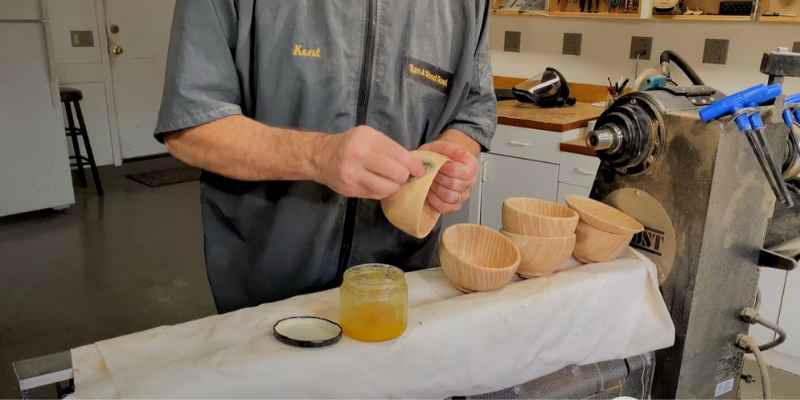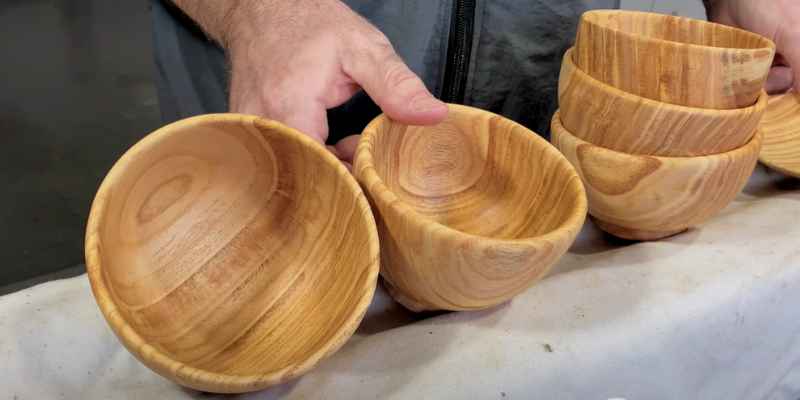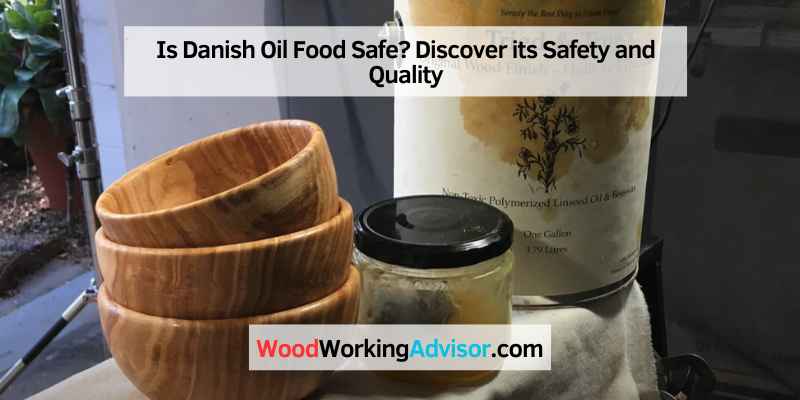Yes, Danish oil is food safe. It is a popular choice for treating wooden kitchenware and is safe to use on surfaces that come into contact with food.
Danish oil provides a natural and durable finish for cutting boards, wooden utensils, and other items in the kitchen. It is made from a blend of pure tung oil and natural resins, and once dried, it forms a hard, waterproof surface that is resistant to stains and food odors.
The oil penetrates the wood, enhancing its natural beauty while also providing protection against moisture and everyday wear and tear. Whether you are a professional chef or a home cook, Danish oil is a reliable and safe option for treating and maintaining your wooden kitchenware.
Safety Regulations And Standards
Danish oil is a popular choice for finishing wood due to its ability to penetrate the wood fibers and provide a protective finish. However, when it comes to using Danish oil on surfaces that come into contact with food, it is important to consider safety regulations and standards to ensure the oil is food safe.
Food Safety Certification
Food safety certification is crucial to guarantee the safety of food contact surfaces. For Danish oil to be deemed food safe, it must adhere to specific criteria and go through rigorous testing processes. Look for certifications such as the FDA (U.S. Food and Drug Administration) or relevant certifications from other regulatory bodies. These certifications indicate that the Danish oil meets specific food safety standards and can be used on food contact surfaces with peace of mind.
Compliance With Fda And Eu Regulations
The FDA and the EU have strict regulations when it comes to materials that come into contact with food. Danish oil must comply with these regulations to ensure it is safe to use on food contact surfaces. The FDA, for example, has guidelines concerning the types of finishes and coatings that can be used on food utensils and packaging materials. Danish oil manufacturers must meet these guidelines to ensure their products are safe for use. Similarly, the EU has its own set of regulations that Danish oil must adhere to. This ensures that the oil is free from harmful substances and meets the required safety standards.

Evaluation Of Danish Oil
When it comes to choosing a finish for wooden surfaces, Danish Oil is a popular and widely used option. It is known for its ability to enhance the natural beauty of wood while providing protection against moisture and wear. However, before using any product on surfaces that come into contact with food, it is important to evaluate its safety. In this article, we will take a closer look at Danish Oil and assess its suitability for food-related applications.
Ingredients And Formulation
Danish Oil is a type of wood finish that is typically made from a blend of drying oils, resins, and solvents. The exact formulation may vary between different manufacturers, but common ingredients include tung oil, linseed oil, and varnish. These ingredients work together to penetrate the wood and create a protective and water-resistant finish.
Toxicity And Allergen Concerns
When considering the safety of Danish Oil for food-related applications, it is essential to assess its toxicity and any potential allergen concerns. Danish Oil, when fully cured, is generally considered to be non-toxic. However, it is important to note that the drying process can release harmful fumes, so proper ventilation is crucial during application and drying.
While Danish Oil is not typically associated with significant allergen concerns, individuals with specific allergies or sensitivities should exercise caution. Some people may have sensitivities to certain oils or solvents used in the formulation. If you or someone in your household has known allergies, it is recommended to check the product label or consult with a healthcare professional before using Danish Oil.
It is worth mentioning that once Danish Oil has fully cured and dried, it is relatively inert and stable. This means that the finish is unlikely to leach harmful substances into food or pose a risk to health. However, for direct food contact surfaces such as cutting boards or kitchen countertops, an additional food-safe topcoat may be applied for an extra layer of protection.
Application And Usage
When it comes to finishing wood surfaces, Danish oil is a popular choice due to its ability to enhance the natural beauty of the grain while providing protection. But if you’re considering using Danish oil in food-related projects, such as cutting boards or kitchen utensils, it’s essential to understand its suitability for food contact and direct consumption.
Food Contact
When using Danish oil for food contact surfaces, it’s crucial to ensure the product you choose is labeled as food-safe. Not all Danish oils are created equal, and some may contain additives or chemicals that make them unsuitable for food contact. Therefore, it’s essential to read the label carefully and look for certifications or indications of food safety.
Direct Consumption
If you’re planning on using Danish oil on items that may come into direct contact with food, such as wooden salad bowls or serving utensils, it’s important to consider the consumption factor. Danish oil typically consists of a blend of drying agents, solvents, and natural oils, such as linseed or tung oil. While these ingredients are generally deemed safe for indirect food contact, direct consumption of items treated with Danish oil should be avoided.
Proper Handling And Storage
When working with Danish oil, proper handling and storage are essential to maintain its integrity and safety. Here are a few key points to keep in mind:
- Always follow the manufacturer’s instructions and safety guidelines during application.
- Apply Danish oil in a well-ventilated area to minimize inhalation of fumes or vapors.
- Allow the oil to dry and cure completely before handling the item.
- Store Danish oil in a cool, dry place away from direct sunlight to prevent deterioration.
By adhering to these guidelines, you can ensure that the Danish oil you use for your woodworking projects remains safe and suitable for its intended purpose.

Alternatives And Recommendations
When it comes to food-safe finishing options, there are several alternatives to Danish oil that you can consider. These alternatives not only provide a protective finish for your wooden utensils and cutting boards but are also completely safe for use with food. In this section, we will explore some natural oil choices that you can use as alternatives to Danish oil.
Food-safe Finishing Options
If you are looking for a food-safe finish for your wooden kitchenware, there are some excellent options to consider. These options are all-natural and free from harmful chemicals or toxins that could be harmful if ingested. Here are some food-safe finishing options:
Natural Oil Choices
One of the most popular alternatives to Danish oil is mineral oil. Mineral oil is a non-drying oil that is safe for food contact. It provides a protective barrier for your wooden utensils and cutting boards, preventing moisture from penetrating the wood and causing damage. It is important to note that mineral oil is not suitable for finishing surfaces that will come into direct contact with heat, such as stovetops.
Beeswax is another natural alternative that can be used as a food-safe finish. It creates a soft, protective layer on the surface of wooden kitchenware, enhancing its durability and increasing resistance to moisture. Beeswax also has natural antibacterial properties, making it a great choice for cutting boards.
If you prefer a more natural option, carnauba wax is an excellent choice. Derived from the leaves of the carnauba palm tree, carnauba wax provides a durable finish that is resistant to water and heat. It is an ideal option for wooden utensils and cutting boards that are exposed to high temperatures.
Walnut oil is another natural oil that can be used as a food-safe finish. It is derived from pressed walnuts and is safe for contact with food. Walnut oil not only enhances the beauty of the wood grain but also provides a protective layer that helps to prevent staining and cracking over time.
When using natural oils as finishes, it is important to reapply them periodically to maintain their protective qualities. Regular reapplication ensures that your wooden kitchenware remains resistant to moisture, stains, and other damage.
In conclusion, while Danish oil is a popular choice for finishing wooden kitchenware, there are several alternatives available that are equally food-safe. Consider using mineral oil, beeswax, carnauba wax, or walnut oil to provide a protective and safe finish for your wooden utensils and cutting boards.
Conclusion
To ensure the safety of using Danish oil on food-related items, it is crucial to choose a food-grade Danish oil that meets industry standards. By carefully evaluating the ingredients and certifications of the oil, consumers can make an informed decision.
Remember, when it comes to the health and well-being of ourselves and our loved ones, it is always better to be safe than sorry.


